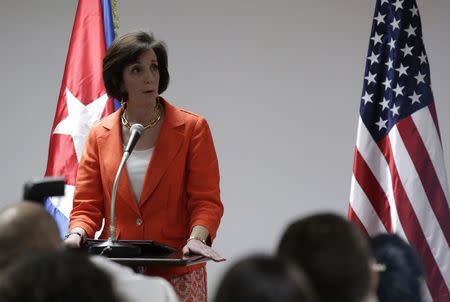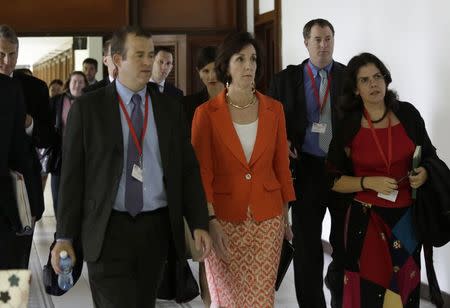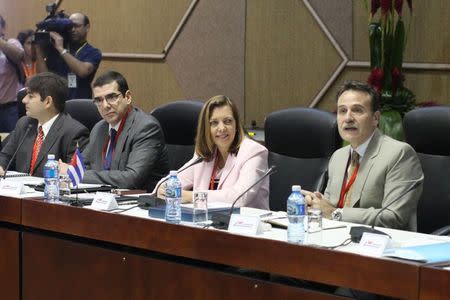U.S. says mistrust must be overcome to restore Cuba ties
By Lesley Wroughton and Daniel Trotta HAVANA (Reuters) - The United States and Cuba moved closer to restoring diplomatic relations on Thursday with historic, high-level talks, but the Americans noted the two sides must overcome more than 50 years of mistrust to normalize trade and travel. The talks were the first since U.S. President Barack Obama and Cuban President Raul Castro announced on Dec. 17 that they would work to restore diplomatic ties, which Washington severed in 1961 two years after Raul's brother, Fidel, took power and began implementing communist rule. U.S. Assistant Secretary of State Roberta Jacobson, who led the American delegation, said re-establishing diplomatic ties and opening embassies in Havana and Washington were "not overly cumbersome," but the two sides had profound differences on other issues, such as Cuba's human rights record. Cuba in turn expressed concern over human rights in the United States, a reference to recent police killings of unarmed black men in Ferguson, Missouri, and New York City. "We have ... to overcome more than 50 years of a relationship that was not based on confidence or trust, so there are things we have to discuss before we can establish that relationship and so there will be future conversations," Jacobson told reporters. Chief among the differences is the comprehensive U.S. trade embargo against Cuba. Obama has loosened parts of the embargo and asked the Republican-controlled Congress to start lifting it. Cuba also told the Americans it wants to be removed from the U.S. list of state sponsors of terrorism before re-establishing diplomatic ties. In immigration talks on Wednesday, Cuba deplored U.S. policies that grant safe haven to Cubans with special protections denied to other nationalities, while the Americans vowed to stand by the so-called Cuban Adjustment Act. The Cuban delegation was led by Josefina Vidal, director of U.S. affairs at the Cuban foreign ministry, who made a rare visit to the official U.S. residence in Havana for a working dinner on the eve of the talks. Vidal said the discussions took place in a "respectful, professional and constructive climate," and that the two sides agreed to meet again at an undetermined date. She cautioned, however, that Havana would not tolerate any interference in its internal affairs. "This process is about the establishment of civilized relations between two countries with profound differences," Vidal said. In one sign of discord, Vidal contradicted Jacobson's assertion the two sides discussed human rights on Thursday. Jacobson said they had while Vidal said they had not. Cuba did say, however, that the topic was broached in a later session that covered a host of bilateral issues, when Cuba expressed concern over human rights in the United States. Cuba bristles at U.S. lecturing about Cuba's one-party system, repression of dissidents and state control of the media, sometimes countering with misgivings about U.S. race relations. "My delegation reiterated its proposal to sustain a respectful dialogue on a reciprocal basis between Cuba and the United States," Gustavo Machin, the second-ranking Cuban official in the talks, told reporters. Jacobson's visit marks the first time in 38 years that a U.S. official of her rank has visited the island nation on official business. (Reporting by Lesley Wroughton, Daniel Trotta and Rosa Tania Valdés; Editing by Peter Galloway, Alan Crosby and Andre Grenon)



